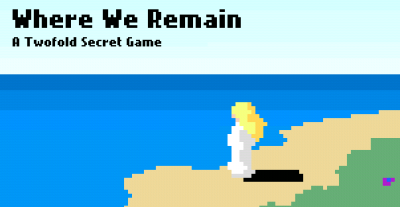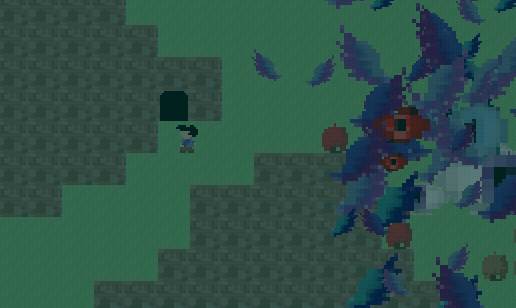Where We Remain
 Saturday, February 27, 2010 at 4:54PM
Saturday, February 27, 2010 at 4:54PM Were We Remain is a roguelike. Or at least it shares some key features of the roguelike genre. The world is randomly generated. There's permadeath. And in the caves, the enemy figures only move when you do in a very turn based fashion.

The game is quite charming. Being a 10 year in the making dream project of Chris and Joel, the attention detail shows. I love pixel art and this game is full of it. The sound design is fitting, functional, and effective. The story is neat, chopped up, and scatter throughout the game like leaves. Where We Remain is a lot like the original Zelda (NES) if you never stumble upon that initial cave to acquire your sword. As you explore the island you'll find caves with various powerups, keys, and helpful hints inside. The colored keys unlock colored doors, and the powerups mostly are movement or map based augmentations.
Like many simple/indie/short games, a large and important part of experiencing Where We Remain is figuring things out for yourself. Without spoiling things, moving through the overworld is the most dangerous part of the game and therefore it has the most tension. Learning the ins and outs of survival on the overworld and the nature of what you're up against is the key to beating the game and uncovering more of the game's story. Which brings into focus an issue of complexities.
I'm the type of gamer who loves depth. To that end, I'll take depth over complexities just about any day. A simple Rock Paper Scissors system can go a long way in creating a structure so that an unlimited number of players can interact forever in meaningful ways. On the other end of the spectrum, complexities are like a specific lines of information in a book. There's only one way to experience this material, and after you do there's not much of a point in experiencing it again. In the 9th episode of Active Time Babble, the complexities of a Roguelike were aptly referred to as "spoilers" (like plot spoilers). Such is the nature of complexities. They're typically not the most emergent parts of the gameplay experience. The less dynamic the game, the less dynamic the complexities. Complexities must be programmed and designed individually. And they can have a very low level of replayability.
The issue that we come to is how can one naturally or practically experience a game's complexities and how the play experience is shaped in the process. After beating Where We Remain a few times, I checked out the hints page because I had a feeling that there was much more to the game hidden under the surface. As I suspected, I was missing 2 endings and a number of other neat details. Without completely spoiling things for myself, I went back into the game to test out a few things. That's when the randomly generated design of Were We Remain started working against the game.
Ultimately surviving on the overworld is a game of cat and mouse. Using the audio and visual warning signs, you can safely explore and eventually beat the game. The problem is playing Where We Remain is mostly about the discovering the details/complexities. Once you figure out what each item does, once you've explored your 4th cave or so, and especially once you've beaten the game the whole experience becomes fairly regular and at times boring. Depending on how a game is designed, randomly generated elements can sort of average the potential challenges and therefore the play experiences to make multiple play sessions more alike than different. Yes the caves, mountains, items, enemies, and the monsters are randomly arranged, but the basic strategies can be applied to almost all situations. Until you know where all the caves are, you'll essentially wander around until you can find an opportunity to use the simple strategies again.

When it gets dark it gets dangerous!
Coupled with the roguelike permadeath, I find that I had to stifle my impulse to experiment for fear of losing it all. During my first play throughs I didn't want to do anything too risky because I didn't know enough. And after I had beaten the game, I didn't want to try new things because I didn't want to start over from scratch again.
I'm curious to know more about the world in Where We Remain. I'm curious to know what the other endings are. I'm curious to know what all the letters said scattered around the island even though each was a bit too long of a read for me (I read most that I came across until I got more repeated letters than new ones). For me there's always youtube.
For anyone who hasn't played Where We Remain, I definitely suggest getting lost on a desert island.


Reader Comments (1)
"During my first play throughs I didn't want to do anything too risky because I didn't know enough. And after I had beaten the game, I didn't want to try new things because I didn't want to start over from scratch again."
That's definitely how I felt. I found the feel of the game compelling, and the story intriguing, but I agree that several elements of the game design ended up working against the whole "play over and over to figure out more of the story" idea.